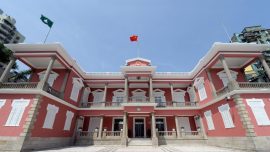Study involving IFTM scholar says hospitality firms can boost business by having good grasp of when consumers try to book a room online for their hotels
Research Corner | A partnership between Macau Business and the Macao Institute for Tourism Studies (IFTM)
Hospitality firms have a lot to gain from understanding when their hotel websites are used by consumers, says a new study involving a scholar from the Macao Institute for Tourism Studies (IFTM). Information on consumer usage patterns regarding a hotel’s website can help that enterprise make informed decisions and lead to improved results, the researchers stated.
The study was produced by IFTM scholar Dr Irene Chan Cheng Chu, in partnership with Jing Ma from the School of Hotel and Tourism Management at the Hong Kong Polytechnic University. Other authors were Prof. Rob Law from University of Macau (the Hong Kong Polytechnic University when the paper was published), Prof. Dimitrios Buhalis from Bournemouth University in the United Kingdom, and Richard Hatter, general manager at Hong Kong’s Hotel ICON, a property owned by the Hong Kong Polytechnic University.
Their paper, titled “Dynamics of hotel website browsing activity: the power of informatics and data analytics”, was published in June’s issue of the academic journal Industrial Management & Data Systems.
The researchers concluded that understanding the fluctuations throughout time of consumer behaviour online could help hotel managers to address a number of challenges and opportunities. “Appreciating seasonality, not only in weeks and months but also in hours, may improve marketing mix formulation,” they suggested. “Bringing the right message online and on social media, when prospective customers aim to engage in dialogue, find additional information and make reservations, is critical to facilitate bookings.”

Rules of (online) engagement
The study was supported by a grant from the Hong Kong Polytechnic University. An early version of the research work had been presented in 2019 in Hong Kong during a joint conference of the Asia-Pacific and European chapters of the International Council on Hotel, Restaurant, and Institutional Education.
The researchers analysed a total of 29,976 hourly weblog files collected from the website of a luxury hotel in Hong Kong, recording the interactions of users with the website. The data covered the period running from August 2014 to December 2017, and referred to almost 5.5 million online visitors to the website.
The results showed that the browsing behaviour of users on the hotel website differed on yearly, monthly, daily and weekly bases, particularly as measured by ‘stickiness’, i.e., the ability of a website to draw visitors and retain them. On one hand, user activity increased steadily from 2014 to 2016, but dropped in 2017. On the other hand, users were most active from the months of July to September each year. On a weekly basis, activity was higher on weekdays; and on a daily basis, from noon to the evening.
The study suggested that hotels could make use of peak periods in terms of website usage, to push a greater number of real-time promotional messages and encourage unplanned purchases. Such a type of strategy could increase the effectiveness of marketing efforts, as a larger user base could be reached during those time periods, the researchers said.
Hotel operators should not however overlook those time periods with lighter activity on their respective websites. “Little traffic and activities imply that resources are being underused, therefore it affects profitability,” the researchers noted. They proposed that hotels offer more online promotional activities during these periods, to boost traffic.
“To fully utilise the hotel website as a marketing and distribution channel, more collaboration with popular search engines and social media sites should be done during off-peak seasons, quiet days and hours, to enhance visibility of the website to the target audience,” the authors wrote. “All these have direct implications to the competitiveness and profitability of organisations”.
In-depth knowledge of consumer usage of a hotel website could also enhance the effectiveness of dynamic pricing and revenue management, it was suggested in the research. “If, for example, people who spend time late at night concentrate on finding lower rates, in contrast with business customers who may appreciate facilities or convenience over price, [this] may lead to differential pricing and alternative offers being available at different times,” it was proposed. “Understanding what the time horizon for the delivery of the service is, and in particular when customers try to book services in real time, calls for the integration of contextual information and interoperability with complementary systems towards dynamic packaging and pricing,” the researchers noted.
There were other points mentioned regarding the usefulness for hotels of being able to forecast peak periods in terms of website usage. These included adequate deployment of resources – including customer services staff – to deal with the extra traffic and pressure on systems. Hotel firms should recognise that these periods “may not reflect normal working hours of marketing, sales or reservations [staff members], but rather when consumers would like to interact and transact,” the researchers pointed.

– The researchers
Dr Irene Chan Cheng Chu is a lecturer at the Macao Institute for Tourism Studies (IFTM). She graduated from the Institute with a Bachelor’s Degree in Hotel Management and subsequently earned a PhD in Hotel and Tourism Management from the Hong Kong Polytechnic University. At IFTM, Dr Chan teaches courses related to management and quantitative methods in the service industry.
Jing Ma is a graduate from the School of Hotel and Tourism Management of Hong Kong Polytechnic University. She holds a Bachelor of Science in Hotel Management.
Professor Rob Law has worked in Canada and Hong Kong in the industrial and academic sectors. He joined the University of Macau in 2021: he is currently a Chair Professor at the Integrated Resort and Tourism Management at that university. He holds a PhD in Computer Science from the University of Regina, in Canada.
Professor Dimitrios Buhalis is a strategic management and marketing expert with specialisation in information communication technology applications in the tourism, travel, hospitality and leisure industries. He is Director of the eTourism Lab and Deputy Director of the International Centre for Tourism and Hospitality Research, at Bournemouth University Business School in the United Kingdom. Prof. Buhalis holds a PhD from the U.K.’s University of Surrey.
Richard Hatter is general manager of Hotel ICON, located in Hong Kong, and which was founded by Hong Kong Polytechnic University. Mr Hatter is also an adjunct associate professor at the university’s School of Hotel and Tourism Management.
– The paper
Irene Cheng Chu Chan, Jing Ma, Rob Law, Dimitrios Buhalis and Richard Hatter: “Dynamics of hotel website browsing activity: the power of informatics and data analytics”, Industrial Management & Data Systems, Volume 121, Issue 6, pages 1398-1416, 2021.
























